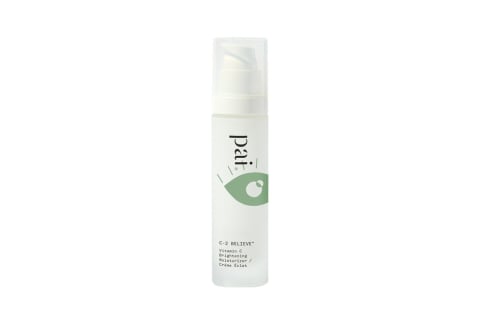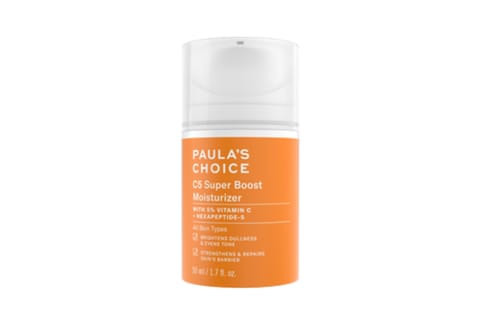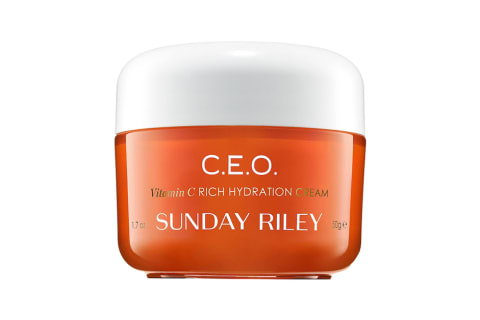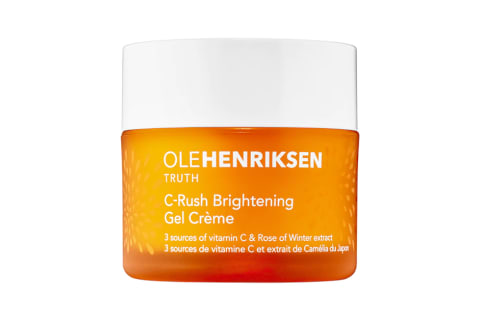Advertisement
Want To Hydrate & Brighten Your Skin? Look For This In Your Moisturizer


Ask any derm, beauty editor, or industry expert their all-time favorite skin care ingredients, and there's a solid chance vitamin C dominates the conversation.
After all, the classic antioxidant is lauded for evening skin tone, stimulating collagen production, and providing an overall glow. I could write a 10-page love letter to vitamin C at this point, but to be honest, layering vitamin C trips me up more than I'd care to admit.
You see, depending on the form, vitamin C can be super unstable (more on that in a moment), so it's a very delicate dance to make sure you don't render it ineffective. And if you're partial to other skin care heroes (like, say, a hyaluronic acid serum), you may have to choose one adventure to avoid compromising on benefits.
A solution? Try a vitamin C moisturizer! Not only can a hybrid formula help you streamline your beauty routine, but it may be the best option out there for super-sensitive skin. Given these perks, it's no wonder plenty of high-quality options have commanded the market of late—I'll bet you'll be besotted with them, too.
Why you should use a vitamin C moisturizer
Look, I have absolutely nothing against vitamin C serums, but they do come with one major gripe: Many formulas are super unstable, namely ones containing L-ascorbic acid, which is the purest and most effective form of vitamin C.
"Ascorbic acid is water-soluble and is not very stable in solution but can be best stabilized at a lower pH—this acidity can be irritating to sensitive skin," says board-certified dermatologist Hadley King, M.D. That's why experts recommend finding a formula with a concentration of 10% ascorbic acid or lower if you have easily irritated skin. Board-certified dermatologist Geeta Yadav, M.D., founder of FACET Dermatology, seconds the warning: "This ingredient performs best in formulas at a pH of 4 or below, but those with sensitive skin types do better with formulas that are closer to the skin's natural pH levels, around 6," she tells mbg.
However! As the sourcing and technology become more and more innovative, brands have figured out how to weave in different forms at clinically effective levels with zero irritation. For example, tetrahexyldecyl ascorbate (also known as THD ascorbate) is an oil-soluble version of the antioxidant and most commonly used in facial oils and moisturizers—so you can have your vitamin C and reap hydration benefits, too.
"A vitamin C moisturizer is a great way to add the ingredient into your routine," Yadav notes. "Vitamin C is known for brightening skin—but if skin is dehydrated, it'll maintain a dull appearance. By combining the hydrating and nourishing benefits of a moisturizer with the brightening and free-radical-fighting benefits of vitamin C, you'll get the best of both worlds."
And because moisturizers typically contain more stable forms of vitamin C, you can layer on your hydrating serums without fear that the brightening antioxidant won't do its job. In fact, "Some studies have suggested that the fatty acid component of THD ascorbate may allow better penetration into the skin," King says, thanks to the ingredient's oil-soluble ability.
How to layer a vitamin C moisturizer
Generally, experts recommend using vitamin C in the morning: "Vitamin C is a fantastic ingredient to combine with sunscreen, as it strengthens its protective effects1," Yadav shares. However, if you'd like to use a vitamin C moisturizer both day and night to leverage its hydrating and antioxidant properties, go right ahead! As someone who uses retinol in a skin cycling routine, I personally like to stick to a simple, nourishing moisturizer at night so I don't overwhelm my skin with too many actives—but a vitamin C moisturizer in the morning has become a godsend.
Plus, unlike some finicky serums, you can apply your antioxidant-infused moisturizer on damp skin to leverage those hydrating ingredients without compromising the effects of vitamin C. To echo Yadav's praise: You really get the best of both worlds.
The takeaway
If you've had trouble figuring out how to layer vitamin C in your routine (a common concern!), try slathering on a vitamin C moisturizer. These innovative formulas are potent, hydrating, and top-notch for sensitive skin—shop our favorites below.















